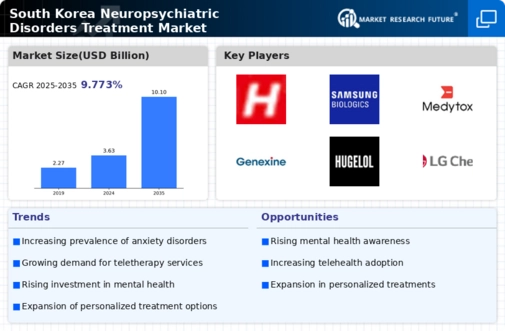Supportive Regulatory Environment
A supportive regulatory environment is fostering growth in the neuropsychiatric disorders-treatment market. The South Korean government has implemented policies aimed at improving mental health services, including streamlined approval processes for new treatments and increased funding for mental health initiatives. These regulatory changes are designed to encourage innovation and facilitate access to care for patients. As a result, pharmaceutical companies are more likely to invest in the development of new therapies, knowing that there is a favorable framework for bringing these products to market. This supportive environment is expected to enhance the overall landscape of neuropsychiatric treatment options available to patients in South Korea.
Advancements in Pharmaceutical Research
Innovations in pharmaceutical research are significantly impacting the neuropsychiatric disorders-treatment market. The development of novel therapeutics, including targeted therapies and personalized medicine, is enhancing treatment efficacy for various neuropsychiatric conditions. For instance, recent breakthroughs in drug formulations have led to improved outcomes for patients with depression and anxiety disorders. The South Korean pharmaceutical industry is investing heavily in research and development, with expenditures reaching approximately $3 billion annually. This investment is expected to yield new treatment options that could transform the landscape of neuropsychiatric care. As these advancements become available, they are likely to attract more patients seeking effective solutions, thereby driving market growth.
Increased Focus on Mental Health Awareness
The growing emphasis on mental health awareness in South Korea is a pivotal factor influencing the neuropsychiatric disorders-treatment market. Public campaigns and educational initiatives are fostering a better understanding of mental health issues, reducing stigma, and encouraging individuals to seek treatment. This cultural shift is reflected in the rising number of consultations with mental health professionals, which has increased by approximately 30% over the past five years. As more people recognize the importance of mental well-being, the demand for neuropsychiatric treatments is expected to rise. This trend is likely to create new opportunities for healthcare providers and pharmaceutical companies within the market.
Growing Prevalence of Mental Health Disorders
The rising incidence of mental health disorders in South Korea is a critical driver for the neuropsychiatric disorders-treatment market. Recent studies indicate that approximately 1 in 5 individuals in South Korea experience some form of mental illness during their lifetime. This alarming statistic underscores the urgent need for effective treatment options. As awareness of mental health issues increases, more individuals are seeking help, thereby expanding the patient base for treatment providers. the neuropsychiatric disorders-treatment market is expected to see substantial growth as healthcare systems adapt to meet this demand.. Furthermore, the South Korean government has recognized the importance of mental health, leading to increased funding and resources allocated to mental health services. This could further stimulate market expansion..
Integration of Technology in Treatment Approaches
the integration of technology into treatment approaches has reshaped the neuropsychiatric disorders-treatment market.. Digital health solutions, including mobile applications and online therapy platforms, are becoming increasingly popular among patients seeking convenient and accessible care. In South Korea, the use of teletherapy has surged, with reports indicating a 40% increase in usage over the past year. This technological advancement not only enhances patient engagement but also expands the reach of mental health services to underserved populations. As technology continues to evolve, it is expected to play a crucial role in the delivery of neuropsychiatric treatments, potentially leading to improved patient outcomes and market growth.



















Leave a Comment